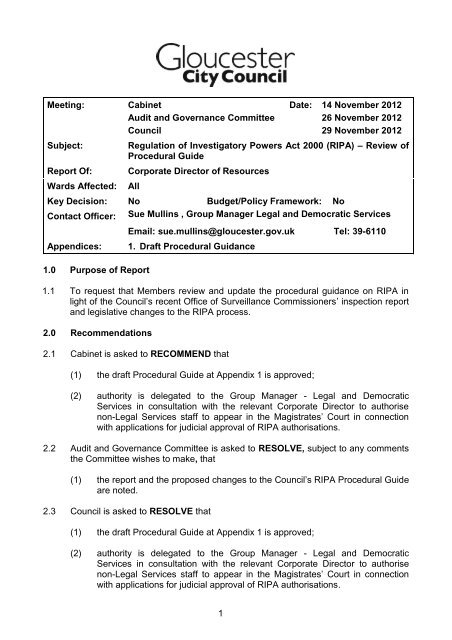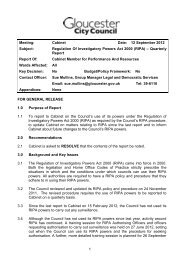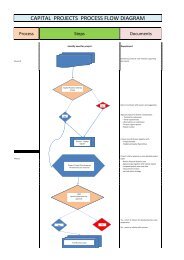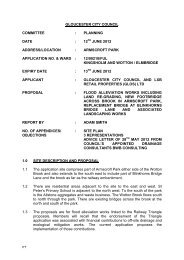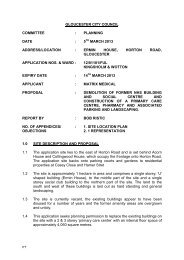Regulation of Investigatory Powers Act 2000 (RIPA ... - Democracy
Regulation of Investigatory Powers Act 2000 (RIPA ... - Democracy
Regulation of Investigatory Powers Act 2000 (RIPA ... - Democracy
Create successful ePaper yourself
Turn your PDF publications into a flip-book with our unique Google optimized e-Paper software.
Meeting:<br />
Subject:<br />
Report Of:<br />
Wards Affected:<br />
Cabinet<br />
Audit and Governance Committee<br />
Council<br />
Date: 14 November 2012<br />
26 November 2012<br />
29 November 2012<br />
<strong>Regulation</strong> <strong>of</strong> <strong>Investigatory</strong> <strong>Powers</strong> <strong>Act</strong> <strong>2000</strong> (<strong>RIPA</strong>) – Review <strong>of</strong><br />
Procedural Guide<br />
Corporate Director <strong>of</strong> Resources<br />
All<br />
Key Decision: No Budget/Policy Framework: No<br />
Contact Officer: Sue Mullins , Group Manager Legal and Democratic Services<br />
Appendices:<br />
1.0 Purpose <strong>of</strong> Report<br />
Email: sue.mullins@gloucester.gov.uk Tel: 39-6110<br />
1. Draft Procedural Guidance<br />
1.1 To request that Members review and update the procedural guidance on <strong>RIPA</strong> in<br />
light <strong>of</strong> the Council’s recent Office <strong>of</strong> Surveillance Commissioners’ inspection report<br />
and legislative changes to the <strong>RIPA</strong> process.<br />
2.0 Recommendations<br />
2.1 Cabinet is asked to RECOMMEND that<br />
(1) the draft Procedural Guide at Appendix 1 is approved;<br />
(2) authority is delegated to the Group Manager - Legal and Democratic<br />
Services in consultation with the relevant Corporate Director to authorise<br />
non-Legal Services staff to appear in the Magistrates’ Court in connection<br />
with applications for judicial approval <strong>of</strong> <strong>RIPA</strong> authorisations.<br />
2.2 Audit and Governance Committee is asked to RESOLVE, subject to any comments<br />
the Committee wishes to make, that<br />
(1) the report and the proposed changes to the Council’s <strong>RIPA</strong> Procedural Guide<br />
are noted.<br />
2.3 Council is asked to RESOLVE that<br />
(1) the draft Procedural Guide at Appendix 1 is approved;<br />
(2) authority is delegated to the Group Manager - Legal and Democratic<br />
Services in consultation with the relevant Corporate Director to authorise<br />
non-Legal Services staff to appear in the Magistrates’ Court in connection<br />
with applications for judicial approval <strong>of</strong> <strong>RIPA</strong> authorisations.<br />
1
3.0 Background and Key Issues<br />
3.1 The <strong>Regulation</strong> <strong>of</strong> <strong>Investigatory</strong> <strong>Powers</strong> <strong>Act</strong> <strong>2000</strong> (<strong>RIPA</strong>) came into force in <strong>2000</strong>.<br />
Both the legislation and Home Office Codes <strong>of</strong> Practice strictly prescribe the<br />
situations in which and the conditions under which councils can use their <strong>RIPA</strong><br />
powers. All authorities are required to have a <strong>RIPA</strong> policy and procedure to which<br />
they adhere in using their <strong>RIPA</strong> powers.<br />
3.2 The Council reviews and updates its <strong>RIPA</strong> Procedural Guide at least annually. The<br />
Council last updated its <strong>RIPA</strong> Procedural Guide in November 2011.<br />
3.3 The Council’s use <strong>of</strong> its <strong>RIPA</strong> powers is subject to annual reporting and triennial<br />
inspection by the Office <strong>of</strong> Surveillance Commissioners (OSC). The Council<br />
received its most recent inspection by the OSC on 27 July 2012 and the OSC’s<br />
report following the inspection has now been received. The report made a small<br />
number <strong>of</strong> suggestions for amendment and improvement <strong>of</strong> the Council’s <strong>RIPA</strong><br />
Procedural Guide and these have been incorporated into the draft Procedure Guide<br />
at Appendix 1.<br />
3.4 As reported to Members in October/November 2011, the Home Office carried out a<br />
review <strong>of</strong> Counter-Terrorism and Security <strong>Powers</strong> in 2010 and the outcomes were<br />
included in the Protection <strong>of</strong> Freedoms <strong>Act</strong> 2012. The <strong>Act</strong> has changed the<br />
Council’s <strong>RIPA</strong> powers as follows:<br />
(i)<br />
(ii)<br />
(ii)<br />
Magistrates’ approval is now required for Directed surveillance and Covert<br />
Human Intelligence Source (CHIS) surveillance before any authorisation<br />
granted by Authorising Officers within the Council can take effect;<br />
Urgent oral authorisations are no longer available, because <strong>of</strong> the judicial<br />
approval process; and<br />
<strong>RIPA</strong> directed surveillance can only be authorised when the <strong>of</strong>fence carries a<br />
maximum custodial sentence <strong>of</strong> 6 months or more or the <strong>of</strong>fence relates to<br />
underage sales <strong>of</strong> tobacco and alcohol.<br />
3.5 The effect <strong>of</strong> the changes is that an authorisation made by the Authorising Officers<br />
within the Council will not come into effect until it has been approved by a<br />
Magistrate. The Magistrate will be required to consider whether it was, and<br />
continues to be, reasonable for the local authority to believe that the use <strong>of</strong> the<br />
covert technique in question is necessary and proportionate. A magistrate is able to<br />
exercise his or her own discretion and judgement when deciding whether to<br />
approve the authorisation.<br />
3.6 Under the new arrangements, a Magistrate may approve the application if satisfied<br />
that it:<br />
<br />
<br />
is necessary for the purposes set out in <strong>RIPA</strong> (for local authorities this is the<br />
prevention or detection <strong>of</strong> crime) and proportionate in human rights terms to what it<br />
seeks to achieve;<br />
has been authorised by a person in the authority at the level designated in <strong>RIPA</strong><br />
(that is, at Director level for Directed Surveillance and Chief Executive level for a<br />
CHIS);<br />
2
meets any other restriction imposed by order – such as the serious crime threshold<br />
that applies to directed surveillance;<br />
sets out, in the case <strong>of</strong> a CHIS, that the relevant procedures and supporting <strong>of</strong>ficers<br />
are in place to protect the welfare and safety <strong>of</strong> the CHIS.<br />
3.7 Where a Magistrate refuses a local authority application he or she will have the<br />
power to quash the local authority authorisation and the proposed surveillance will<br />
not be possible. Judicial approval is also now required for renewal <strong>of</strong> authorizations,<br />
but not for reviews and cancellations.<br />
3.8 Home Office guidance on the judicial approval process is expected to be issued on<br />
1 November 2012 and the draft Procedural Guide also takes into account this<br />
guidance. It is anticipated that the judicial approval process will amount to a “legal<br />
proceeding” and the Council will need to authorise Officers to appear on its behalf<br />
before a Magistrate. The Group Manager Legal and Democratic Services has<br />
delegated authority under the Constitution to authorise solicitors and legal staff to<br />
represent the Council in legal proceedings, but not to authorise non-legal staff to do<br />
so. In order to ensure that applications for judicial approval can be made by an<br />
appropriate Officer, it is suggested that the delegation to the Group Manager- Legal<br />
and Democratic Services is extended to allow them to authorise non-legal staff to<br />
appear before a Magistrate.<br />
3.9 In view <strong>of</strong> the substantial changes to the Council’s <strong>RIPA</strong> powers, refresher training<br />
was provided to Authorising and Investigating Officers on 26 September 2012 to<br />
ensure that Officers’ knowledge <strong>of</strong> <strong>RIPA</strong> is kept up-to-date and that Officers are<br />
aware <strong>of</strong> the factors they need to take into account in requesting or authorising use<br />
<strong>of</strong> the Council’s surveillance powers.<br />
4.0 Alternative Options Considered<br />
4.1 The Council still has and can make use <strong>of</strong> other investigatory powers, such as overt<br />
surveillance, when investigating potential criminal <strong>of</strong>fences, but must comply with<br />
<strong>RIPA</strong> when it carries out Directed Surveillance or CHIS. There are therefore no real<br />
alternative options relevant to the Council’s use <strong>of</strong> its <strong>RIPA</strong> powers.<br />
5.0 Reasons for Recommendations<br />
5.1 The revisions set out in the draft Procedural Guide and the delegated powers<br />
requested are required either to implement the recommendations made by the OSC<br />
inspection report or to take into account legislative changes coming into effect on 1<br />
November 2012.<br />
6.0 Future Work and Conclusions<br />
6.1 The revised procedures will help to ensure that the Council uses its <strong>RIPA</strong> powers<br />
responsibly and within the legislation and guidance. Further revisions to the<br />
Procedural Guide may be required, depending on any changes to the legislation or<br />
statutory Home Office Guidance.<br />
3
7.0 Financial Implications<br />
7.1 There are no direct financial implications arising out <strong>of</strong> this report. At present, there<br />
is no fee payable to the Magistrates’ Court for the judicial approval process. The<br />
authorisation process now has additional steps - the application for judicial approval<br />
will have to be prepared and at least one <strong>of</strong>ficer will need to attend the Magistrates’<br />
Court to make the application – and these will be met from within existing<br />
resources. As the Council uses its <strong>RIPA</strong> powers sparingly (two authorisations in the<br />
last three years), it is not anticipated that the additional steps will be particularly<br />
burdensome.<br />
8.0 Legal Implications<br />
8.1 These are set out in the main body <strong>of</strong> the report.<br />
9.0 Risk & Opportunity Management Implications<br />
9.1 Having a procedural guide that complies with the legislation and guidance and<br />
ensuring that <strong>of</strong>ficers using <strong>RIPA</strong> powers are fully trained in the use <strong>of</strong> the powers<br />
will help to reduce the risk <strong>of</strong> the Council using its <strong>RIPA</strong> powers unlawfully.<br />
10.0 People Impact Assessment (PIA):<br />
10.1 The impact <strong>of</strong> the changes to the <strong>RIPA</strong> legislation will have been considered by the<br />
Government during the drafting <strong>of</strong> the legislation. The <strong>RIPA</strong> legislation requires the<br />
Council to give substantial consideration to the people impact <strong>of</strong> using its <strong>RIPA</strong><br />
powers each and every time a <strong>RIPA</strong> application is authorised.<br />
10.2 The PIA Screening Stage was completed and did not identify any potential or actual<br />
negative impact, therefore a full PIA was not required.<br />
11.0 Other Corporate Implications<br />
Community Safety<br />
11.1 The use <strong>of</strong> <strong>RIPA</strong> powers by the Council can contribute to ensuring community<br />
safety.<br />
Sustainability<br />
11.2 There are no sustainability implications arising out <strong>of</strong> this report.<br />
Staffing & Trade Union<br />
11.3 There are no staffing or Trade Union implications arising out <strong>of</strong> this report.<br />
Background Documents: The <strong>Regulation</strong> <strong>of</strong> <strong>Investigatory</strong> <strong>Powers</strong> <strong>Act</strong> <strong>2000</strong>.<br />
The <strong>Regulation</strong> <strong>of</strong> <strong>Investigatory</strong> <strong>Powers</strong> (Directed<br />
Surveillance and Covert Human Intelligence Sources) Order<br />
2010 (SI 2010/521) Home Office Guidance on the use <strong>of</strong><br />
Directed Surveillance and Covert Human Intelligence Source<br />
surveillance The Criminal Procedure Rules 2012 (SI<br />
2012/1726)<br />
4


